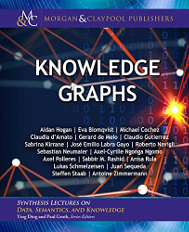Pre-requisite
This course requires that you had previous courses on logic. You can consult the course taught to first year students (in French). In addition, I provide a summary of the main concepts in English, that is fine tuned to align with what I present in this course. Basics of information systems and programming (in any language) are also relevant. In particular, you must be able to build conceptual data models.
Online textbook for this course
A book on Knowledge Graphs was published in 2021 that is available online for free. We will rely on this book at several occasions.
Homework and evaluation
The evaluation will be based on two activities: (1) an individual theoretical evaluation, in the form of an MCQ; and (2) homework, to be delivered by mid-April, that can be done in groups of 3 or 4 students.
Homework: a knowledge model for socio-technical networking platforms
A socio-technical network is similar to a social network in that it connects people via social relationships, but it also include non-human entities that can be connected with each others or with people. Examples of non-human entities are bots that do systematic tasks, robots, applications, or intelligent software.
The goal of this work is to build the knowledge infrastructure that can be consumed by intelligent agents.
Detailed instructions are available on a separate page (to be completed...).
Online evaluation
This will be a questionnaire that must be done strictly individually. It will focus on theoretical knowledge related to logics that I present in this course, and some design patterns for knowledge representation. All logics are presented in the same manner, using the general concepts of logics. For instance, propositional logic and first order logic.
I will provide an example questionnaire for training. You can consult the written exam and resit exam from 2019 and the 2020 exam.
Sessions
Here is a schedule of the session, with links to relevant resources.
- until
- A light-weight first approach of KR&R using boxes. Introduction to KR&R. Reminder of Propositional logic and First Order Logic. Tutorial session: instructions. Room S214.
- Between the session 1 and session 2
- Read the introduction of the Knowledge Graphs book. This is approximately 3.5 pages.
- until
- Introduction to Knowledge Graphs. Relevant parts: Chapter 1, Section 2.1, and Section 3.2. Quick MCQ related to the introduction to the KG book (5 minutes). Practical session: instructions. Room S132.
- Between the session 2 and session 3
- Read Section 2.1.1 Directed edge-labelled graphs and Section 3.2 Identity. This is approximately 7 pages.
- until
- Ontologies and description logics. Relevant sections: Section 3.1.1, Chapter 4. See also Description Logics: the 𝓔𝓛 family, the 𝓕𝓛 and 𝓐𝓛 family, the DL-Lite family, etc. Quick MCQ related to the parts that you have to read in the KG book. Practical session with the Protégé editor, using the Protégé tutorial. In French, vous pouvez aussi consulter un enregistrement vidéo de l’utilisation de Protégé. Relevant section: Section 6.5. Second part of the session: Building ontologies in practice. Practical session: instructions. Room A022.
- until
- Ontology-based data access. Practical construction of knowledge. Relevant section: Section 6.4.1. Practical session: Ontop tutorial. Room S214.
- Between the session 4 and session 5
- Read Section 4.1 Ontologies. This is approximately 10 pages.
- until
- Ontology engineering. Presentation of the slides on Knowledge Modeling from Heiko Paulheim. Relevant chapter: Chapter 6 and specifically, Section 6.5.1. Second part of the session: work in groups on the social network model. Room S132.
- until
- Exam. Room A022.
Logics
I present in separate pages different logical formalisms that can be used to represent different aspects of knowledge. Not all of them will be studied, and not all need to be known.
- Propositional logic
- First order logic
- First Order Logic with equality
- Horn logic
- Simple knowledge graph formalism and RDF
- Description Logics: the 𝓔𝓛 family, the 𝓕𝓛 and 𝓐𝓛 family, the DL-Lite family, etc.
- Allen’s temporal algebra
- Temporally annotated logic (logic with validity time)
- Modal logics: K, T, S4, S5, B, temporal modal logic, deontic logic, epistemic logic
- Region Connection Calculus: RCC5, RCC8
- Non-monotonic logics: default logic, defeasible logic, closed world assumption, circumscription
- Contextual logics: McCarthy’s contextual logic, context with annotation semirings, Distributed Description Logics, Multi Context Systems
External resources
Those are articles, books, web sites that can be useful to find more information on the topic.
- [Book] An introduction to knowledge graphs, with most relevant parts being Chapters 1, 2, 3, 4 and 6: Hogan et al. Knowledge Graphs, Morgan & Claypool, 2021. A version with one Web page per chapter exists.
- [Video lectures] Youtube channel of Prof. Frank van Harmelen has a playlist on knowledge engineering that is extremely relevant for your homework. Especially, look at the part on ontologies (plus this one and that one); and you may look at the parts on knowledge acquisition (and this one, that one, that other one, this other one, and this final one) but they are not directly useful for the evaluation of this course.
- [Video lectures] Youtube channel of Prof. Barry Smith has lectures on ontology building for engineers
- [Online course - no video]University of Mannheim course IE 650 Knowledge Graphs by Prof. Heiko Paulheim. Content is available at the bottom of the page in section Materials and Exercise Sheets. Of particular interest to this course, see Knowledge Modeling.
- [Online course - no video]University of Edingburg course on KG: Knowledge Graphs by Prof. Jeff Z. Pan.
- [Online course - no video] Stanford course on Knowledge Representation and Reasoning by Prof. Vinay K. Chaudhri.
- [Open MOOC - no enrollment necessary] MOOC on Knowledge Graphs, by Harald Sack and Mehwish Alam. Anyone can register for this course by creating a free account, and you can watch all videos in any order.